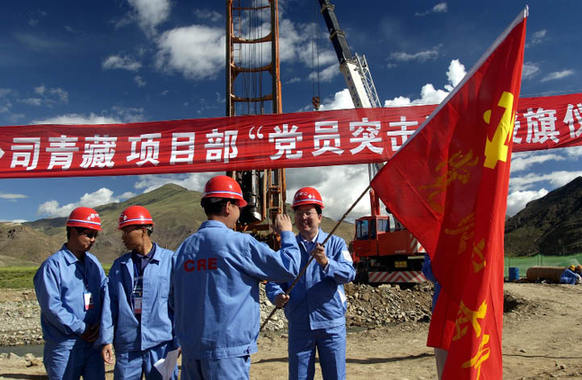| The Party: A Retrospective
By staff reporters AN XINZHU, LI GUOWEN & LI WUZHOU
|

|
| Flag presentation ceremony for the "Party Members Commando Team" during construction of the Qinghai-Tibet Railway. China Foto Press | WHAT image of the Communist Party of China (CPC) is held by its common membership? Over the last 90 years, has the Party changed, and if so, in which respects? What problems and challenges does the Party face today? What does its future look like? To answer these questions, we chose to interview five members of the CPC, who represent different regions, work in different fields, and joined the CPC in different periods.
Image of the CPC
With a total of 78 million members, the CPC is the largest political organization in the world. "The CPC is like the spine of a human body, providing the most basic and central support needed by the country," Zhao Fengjun, a retired cadre, summarized his view of the Party as that.
Zhao joined the CPC in 1960 and worked in the CPC Laoting County Committee, Hebei Province for 27 years, for some time serving as its deputy secretary. He said, in dealing with such far-reaching emergencies as the financial crisis, earthquakes and the SARS epidemic, the CPC played a critical leadership role.
This conclusion was confirmed by another Party member Zhang Manzhao in our interviews. "The CPC has always been on the frontline of all our fights against adversity," said the deputy secretary of the CPC, Wujiajiao Village Branch Committee in Shanxi Province. Zhang joined the Party in 1970 and had worked in Taiyuan, Wuhan and Baoshan Steelworks when in 1973, he joined Wuhan Steelworks which was expanding its production scale. He was no stranger to low salaries, bad living conditions, overtime, sweltering weather or hard work. Far from being privileged, the labor intensity and working hours of the Party members exceeded that of non-members.
"In its 90 years, the Party has always chosen the correct development paths," Zhao's observation on the Party expressed his confidence. "For example, the policy to establish base areas in rural areas and finally seize the cities during the revolutionary period, and at the Third Plenary Session of the 11th CPC Central Committee, the shift of focus to economic construction."
The third matter that impressed Zhao is the Party's emphasis on development. For the six decades the CPC has controlled the helm of state, the national economy has rapidly gained strength especially since reform and opening-up. In the 1960s and 1970s, most Chinese people were without adequate food and clothes, and even in the 1980s, the level of modernization in Beijing was not up to standard for world class cities. "True, China is first-rate in such sectors as high-speed railways, electronics and computer and other technologies, however a former vice president of the Xinhua News Agency explained to us in a lecture once that in terms of economic power, one Japan was equal to seven Chinas, and one U.S. was equal to 12 Chinas. Nevertheless China currently stands as the world's second-largest economy, outpacing Japan. In the past, Taiwan was renowned in the world for being one of Asia's four 'Tigers,' but Guangdong Province has surpassed Taiwan today in terms of GDP," Zhao pointed out.
"What impresses me most is the Party's ability to mobilize and organize," remarked Zhao Zhongxiu, dean of the School of International Trade and Economics, University of International Business and Economics. Zhao became a CPC member in 1986, and has engaged in the study of international trade for many years. He credits the CPC's strong organizational ability and high discipline for its power to mobilize people from various sectors of the society in critical periods, and for its success in handling major affairs of state and grave national emergencies. The CPC embodies order, effectiveness and forceful action.
|
